Batareyalar qimor kabi hissiyotlarni his qiladi. Siz katta narxlarning farqlarini ko'rasiz va sizning mijozlaringizga zarar etkazadigan yomon mahsulotlar uchun ortiqcha ish haqi haqida tashvishlanasiz.
Ulgurji, bir juft qo'rg'onlik batareyalari $ 30- $ 70 turadi, litiylar esa $ 300 + $ 300 + dan iborat. Distribyutorlar ularni asl skuter fabrikasidan, iiboba kabi bi2b kabi va kerakli etkazib beruvchilardan tortib olingan B2B platformalarida olib tashlangan.
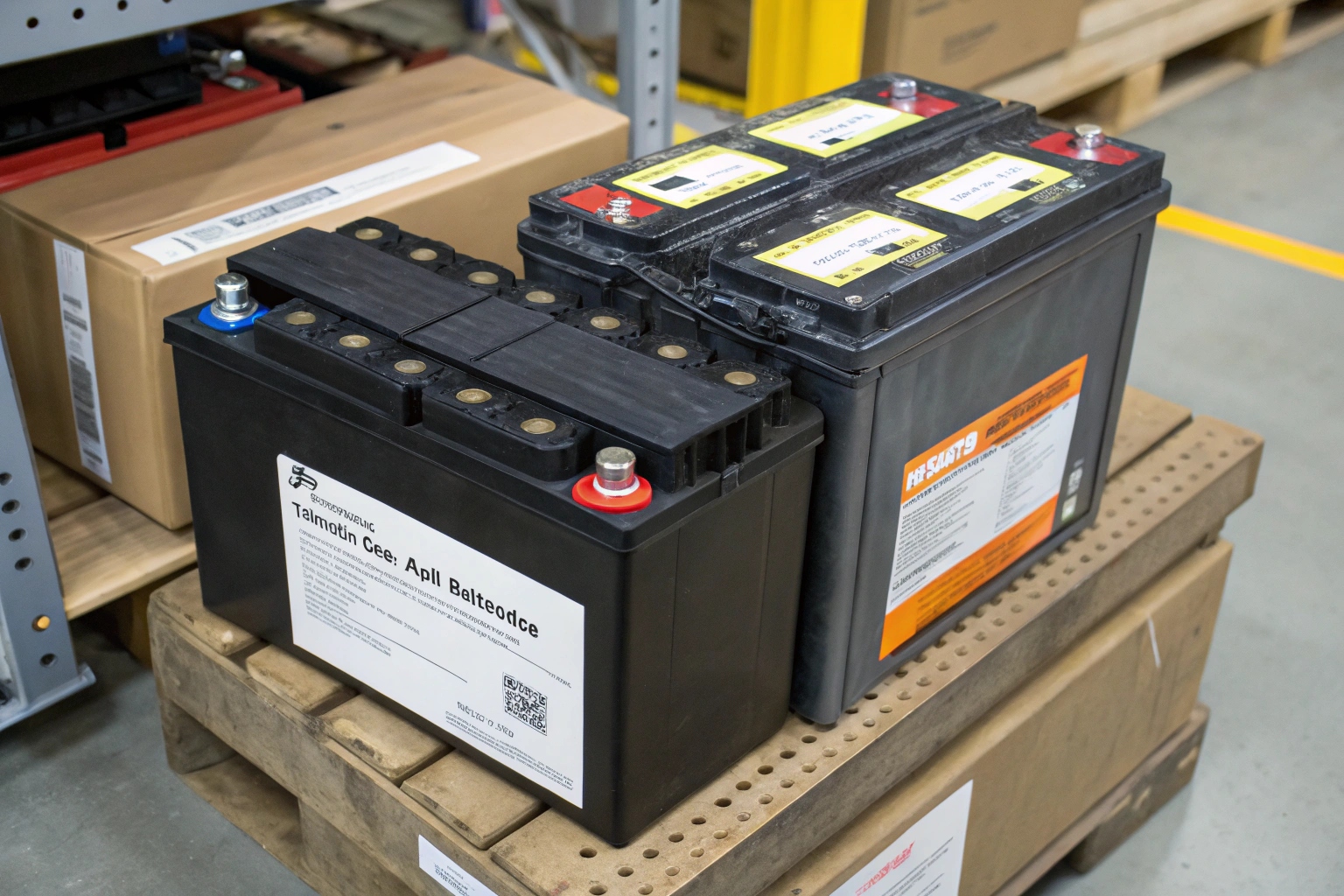
Ishlab chiqaruvchi sifatida men har kuni batareya bilan shug'ullanaman. Ushbu komponentning narxi va sifati biz ishlayotgan import qiluvchilar uchun mahsulot qatorini yaratishi yoki buzishi mumkin. Siz veb-saytda ko'rib chiqadigan oxirgi narx - bu aysbergning uchi. Zavod darvoza narxini va ishonchli sheriklarni qaerdan topish mumkinligini tushunish ushbu sohadagi har qanday biznes uchun juda muhimdir. Keling, muvaffaqiyatli distribyutorlardan foydalanish uchun haqiqiy raqamlar va normallashtirish strategiyasini ko'rib chiqaylik.
Batareya turi bo'yicha odatiy ulgurji narxlar qanday?
Siz arzon narxlarga shubhali darajada arzon narxlarda ko'rasiz. Ulgurji ulgurji narxi nima ekanligini bilish qiyin, biznes byudjetini rejalashtirish qiyin.
Katta ulgurji buyurtmalar uchun har bir 12V bosh kislotali batareya uchun $ 15- $ 35 atrofida to'lashni kutadi. Odatda 80 AQSh dollaridan 250 dollargacha bo'lgan bitta lityum batareya to'plami ko'proq bo'ladi.
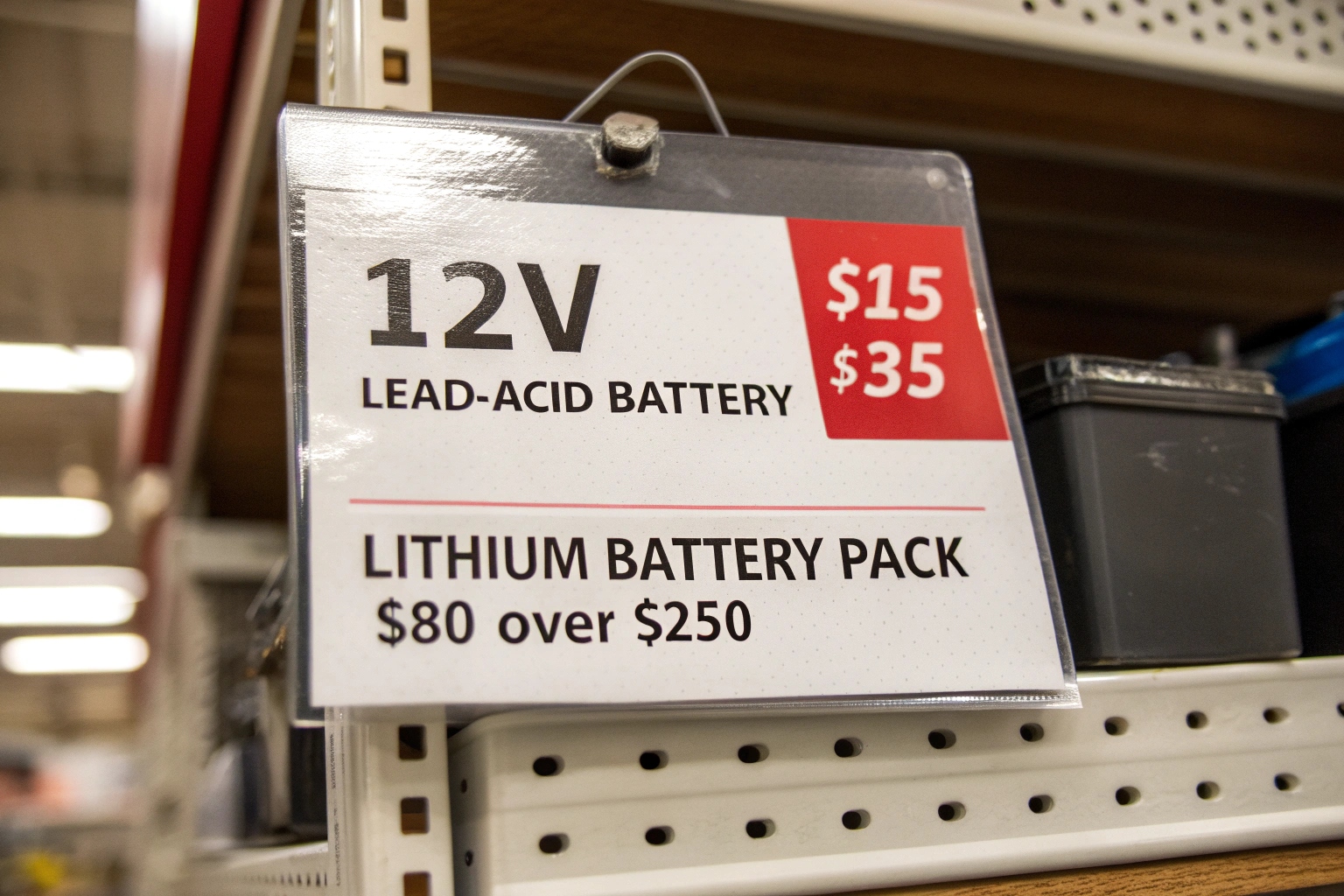
Bizning B2B mijozlarimiz narxlar ro'yxatini so'raganda, men har doim bu ekanligini tushuntirib boshlayman sobiq ish Narxlar, zavod eshigi narxini anglatadi. Sizning oxirgi qo'nish xarajatingiz etkazib berish va import soliqlaridan keyin yuqori bo'ladi. Narxi shuningdek buyurtma hajmiga juda sezgir. 10 dona namunaviy buyurtma 500 donaning to'liq konteyneriga qaraganda birlik uchun yuqori narxga ega bo'ladi. Quyidagi raqamlar, siz to'g'ridan-to'g'ri Xitoyda zavoddan to'g'ridan-to'g'ri normal bo'lish paytida siz quyma buyurtma uchun to'lashingiz kerak bo'lgan yaxshi qo'llanma. Bu sizga berilgan taklifingiz raqobatdoshmi yoki yo'qligini bilishga yordam beradi.
Mana, tipik ulgurji narx jadvali:
| Batareya turi & Ishdan foydalaning | Umumiy qobiliyat (ah) | Oddiy ulgurji narxi (birlik uchun) |
|---|---|---|
| Muhrlangan qo'rg'oshin kislotasi (SLA / AGM) | ||
| Sayohat / katlama skuterlari uchun | 12AH - 22AH | $ 15 - $ 25 |
| O'rta o'lcham uchun & Katta skuterlar | 35AH - 55Am | $ 30 - $ 50 |
| Lityum-ioni (drepo4) | ||
| Sayohat / katlama skuterlari uchun | 12AH - 20AH | $ 80 - $ 150 |
| O'rta o'lcham uchun & Katta skuterlar | 30Ax - 50ana | $ 150 - $ 300 + |
Ushbu narxlar standart, sifatli batareyalar uchun mo'ljallangan. Agar siz batareya paketingiz ichidagi mashhur brenddan premium hujayralarini istasangiz, narx 20-40% ga oshishi mumkin.
Narxga nima ta'sir qiladi - kimyo, brend yoki sig'immi?
Ikkita batareyalar bir xil ko'rinishi mumkin, ammo juda boshqa narxlarga ega. Mijozlaringiz uchun qancha funktsiyalarni hal qilishda qaysi xususiyatlar eng muhim xususiyatlarga ega ekanligiga ishonchingiz komil emas.
Imtiyoz (ah) eng katta narx omilidir - ko'proq kengroq xarajatlar ko'proq. Ikkinchidan, kimyoviy, Litiy bilan etakchilikka qaraganda 2-3 marta qimmatroq. Uchinchisi - keng narxlar o'zgaruvchanligini keltirib chiqaradigan ichki hujayralarning sifati.
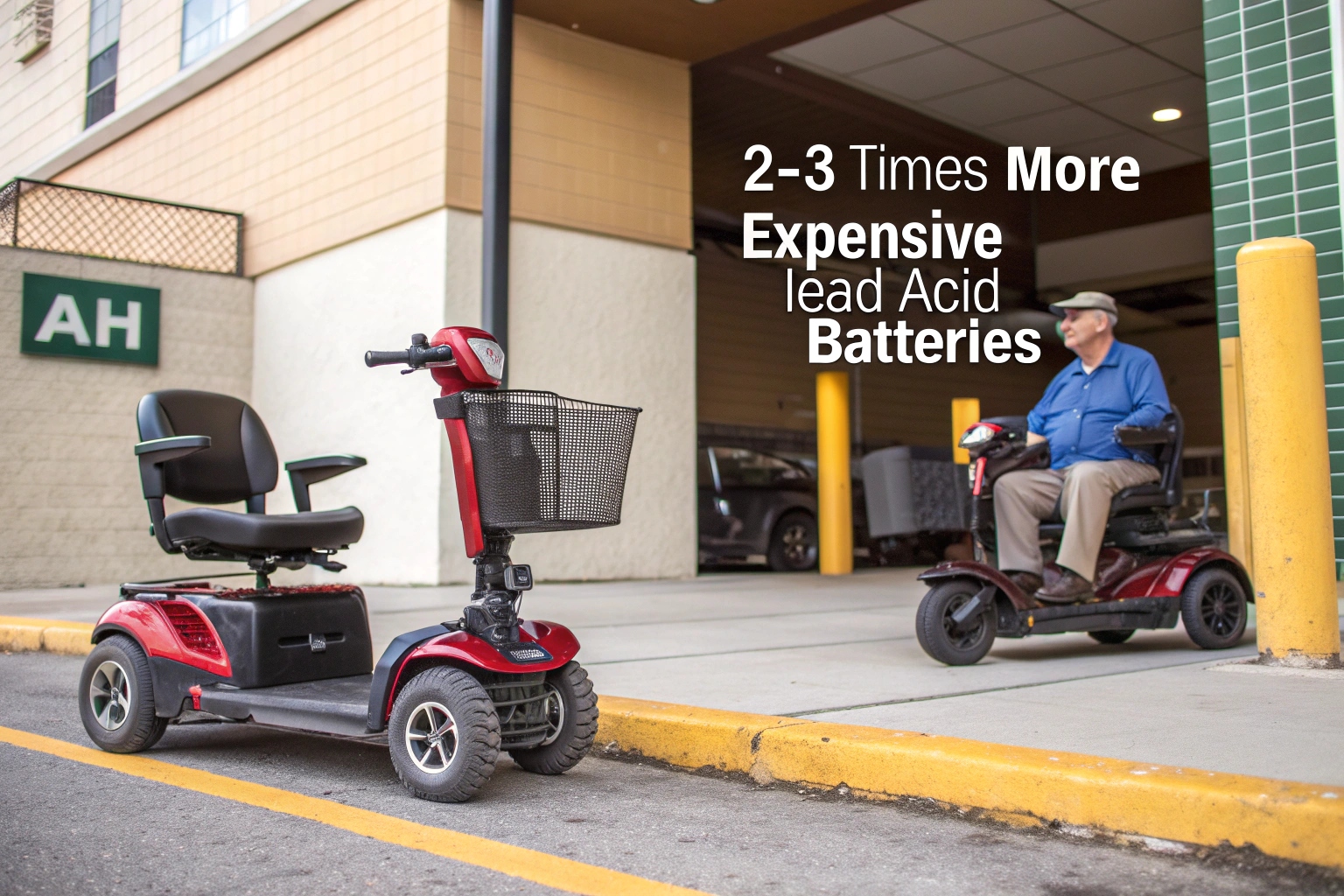
When a client wants the "cheapest" battery, I have to explain that "cheap" can mean different things. Is it a low upfront cost or the best long-term value? The final price tag is a result of three main factors, and understanding them helps you compare quotes intelligently.
1. Imkoniyat (AMP-soat yoki ah)
Bu oddiy: quvvati - bu yonilg'i idishining o'lchami. Yuqori ahamiyati bilan batareya, skuterni uzoqroq sayohat qilish uchun ko'proq energiya sarflashi mumkin. Shuningdek, u qurish uchun ko'proq xom ashyo talab qiladi, shuning uchun u har doim ko'proq xarajat qiladi. 45Am batareyasi bir xil turdagi 20a-ning batareyasidan qimmatroq bo'ladi.
2. Kimyo (etakchilik - Litiy)
Rahbar kislotasi texnologiyasi eski, og'ir va arzon. Litiy - bu eng samarali, yanada samaraliroq bo'lgan zamonaviy texnologiya. Xom ashyo va qo'shilgan elektronika lityum batareyasini yanada qimmatga tushadi.
3. Ichki hujayralarning sifati va brendi
Bu eng muhim omil va eng ko'p yangi importerlar o'tkazib yuborishadi. Batareya to'plami birgalikda bog'langan ko'plab kichik hujayralardan qilingan. Ikkita 20-chi Lityum batareyalar juda turlicha narxga ega bo'lishi mumkin, chunki bittasi arzon, boshqa ishlatilgan hujayralardan foydalanishi mumkin, boshqa foydalanadi. Yaxshi hujayralar yaxshiroq ishlashni davom ettiradi, oxirgi marta tsikl va ancha xavfsizroq. Bu ba'zi etkazib beruvchilarning pastki hujayralar yordamida juda arzon narxni taklif qilish uchun oddiy usul. Har doim ichidagi narsalardan so'rang.
Distribyutorlar batareyalar batareyalari qayerda ishonchli?
Sizga sifatli batareyalar kerak, ammo qaerga qarash kerakligini bilmayman. Onlayn saytlar xavfli va real fabrikalar emas, balki sizni tashvishga soladigan haqiqiy fabrika emas.
Jiddiy distribyutorlar uchta asosiy kanaldan foydalanadilar: 1) asl skuter fabrikasi (masalan Agl), 2) ixtisoslashgan batareya ishlab chiqaruvchilar yoki 3) Alibaba kabi B2B platformalarida ehtiyotkorlik bilan etkazib beruvchilarni sinchkovlik bilan qoplangan. Eng yaxshi tanlov sizning buyurtmangiz hajmiga bog'liq.
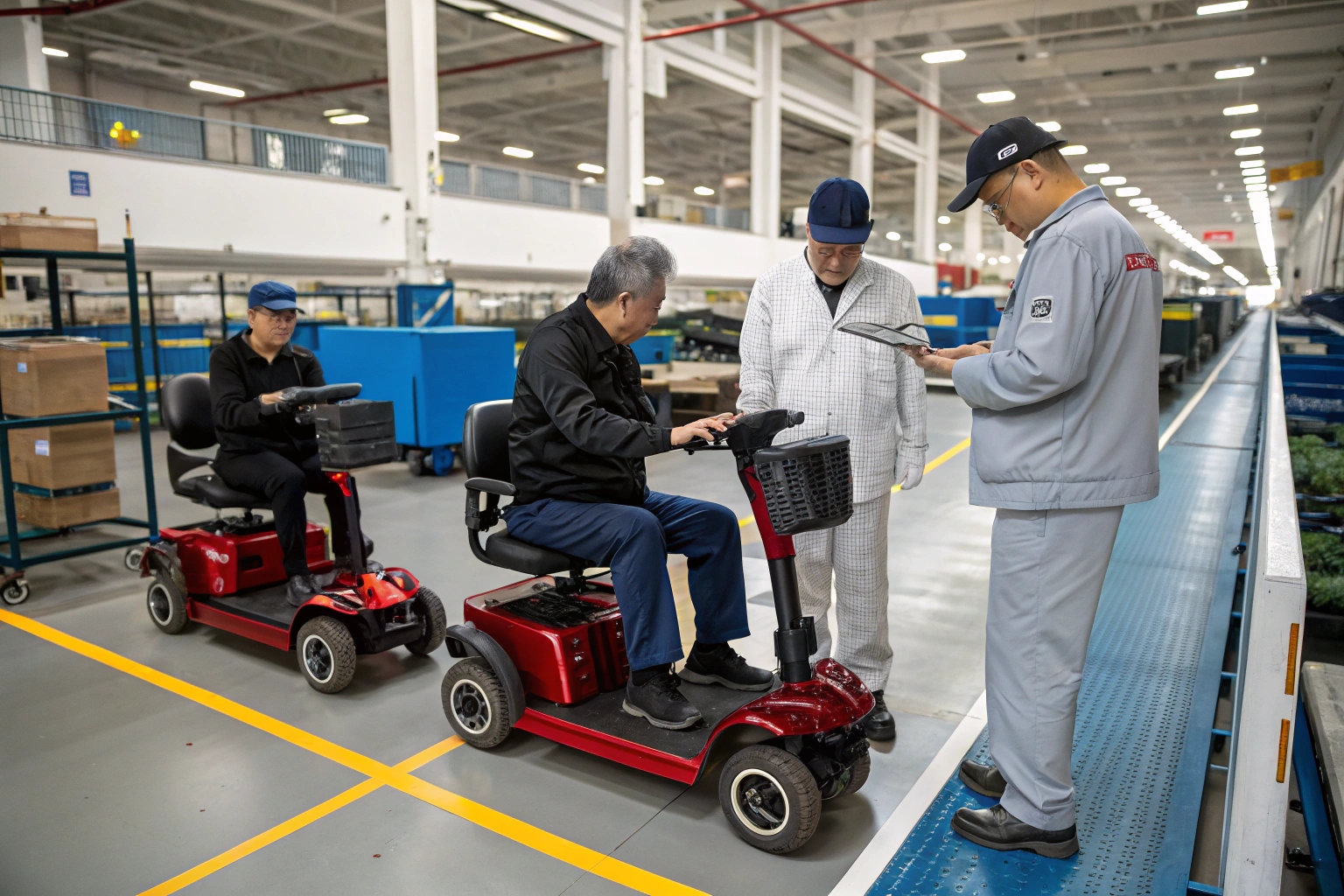
Yetkazib beruvchini topish oson. Yaxshi, ishonchli, uzoq muddatli sherik topish qiyin. Yillar davomida men eng muvaffaqiyatli tarqatish sohasidagi sheriklarimiz ushbu uchta usuldan biri yordamida ta'minot zanjirini ko'rdim. Ularning har biri uning ijobiy va salbiy tomonlariga ega.
- 1-MAVZU: Avtotransport vositasini ishlab chiqaruvchisi (OEM)
Bu biz. Distribyutor fabrikamizdan skuterlarni sotib olganda, ular ko'pincha zaxira batareyalarni bir vaqtning o'zida sotib olishadi.- Pro: Batareyalar 100% mos keladi. Siz yuk tashish va batareyalarni bir xil idishga solib, lookiistik xarajatlarni tejash uchun skuterlar sifatida bir xil idishga soling. Siz allaqachon ishongan etkazib beruvchi bilan shug'ullanasiz.
- Izoh: Narx fabrikasi fabrikasidan biroz yuqori bo'lishi mumkin, chunki biz kichik marja qo'shmoqdamiz.
- 2-Manba: ixtisoslashgan batareya fabrikasi
Juda katta buyurtma uchun ba'zi distribyutorlar to'g'ridan-to'g'ri fabrikalarga boradilar faqat batareyalarni yarating.- Pro: Siz eng yaxshi narxni olishingiz mumkin. Ular chuqur texnik bilimlarga ega va shaxsiy echimlarni taklif qilishi mumkin.
- Izoh: Ularda minimal buyurtma miqdori (Maks), ko'pincha minglab birliklar mavjud. Bu kichik biznes uchun emas. O'zingiz logistika va sifatni boshqarish uchun siz bilan shug'ullanishingiz kerak.
- 3-manba: B2B platformalari (masalan, Alibaba)
Bu eng keng tarqalgan boshlang'ich nuqta.- Pro: Juda raqobatbardosh ko'rinadigan katta selektsiya va narxlar.
- Izoh: It is very risky. Many sellers are "trading companies" who don't make anything. Quality can be very inconsistent. You must do a lot of work to verify the supplier is a real factory.
Batareya etkazib beruvchilarini B2B buyurtmalariga qanday taqqoslash mumkin?
Sizda uchta tirnoq bor va eng arzonlari juda jozibali. Ammo bilasizki, narx hamma narsa emas va endi yomon qaror keyinchalik sizning biznesingiz uchun ofat bo'lishi mumkin.
Har doim narxni o'zgartiring. Minimal buyurtma miqdori (Mun), ishlab chiqarish qo'riqchati, batareya quvvati, kafolatli brend, kafolat shartlari va xavfsizlik sertifikatlari asosida etkazib beruvchilarni taqqoslaydi. Avval sinov uchun har doim namunaga buyurtma bering.
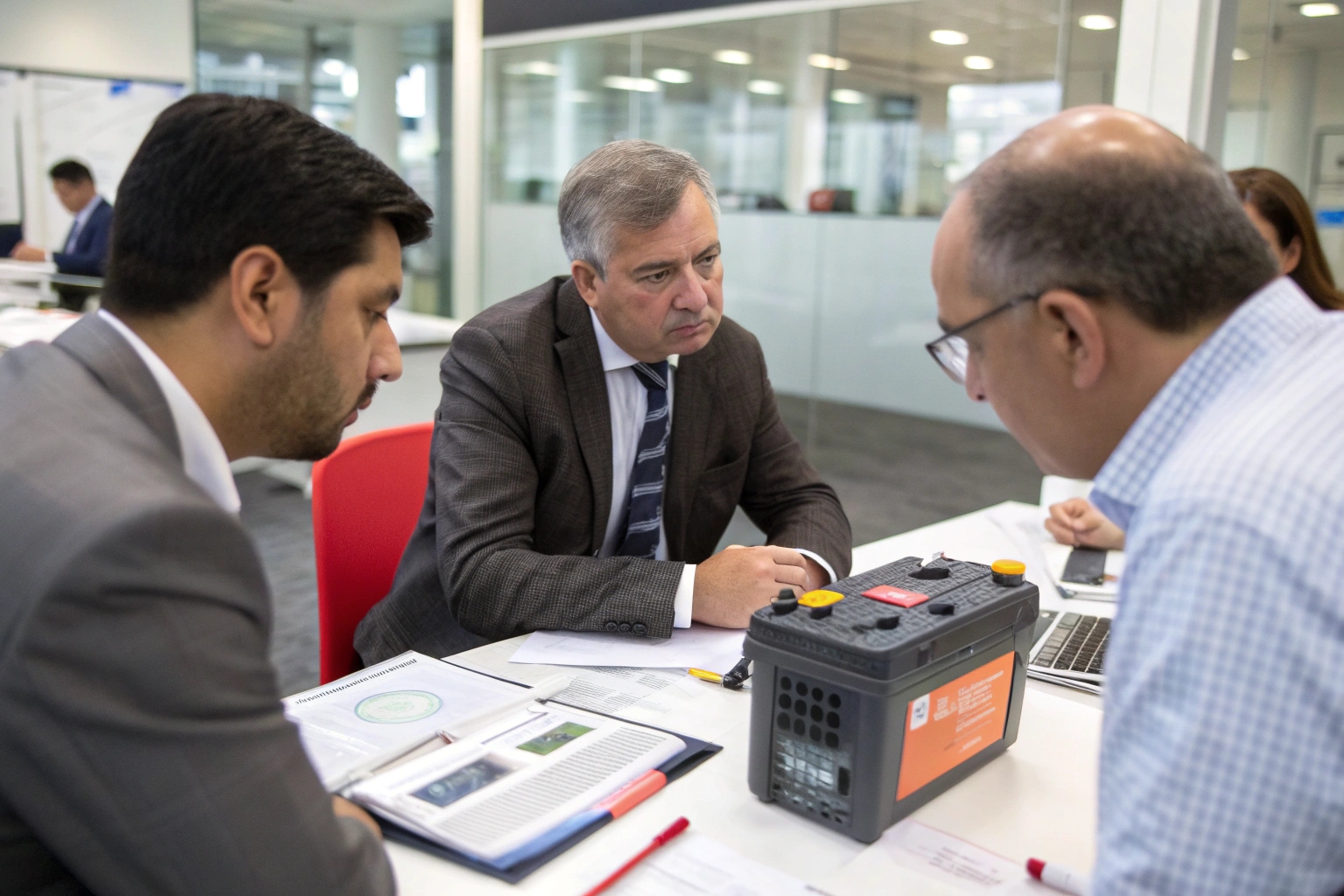
Uzoq muddatli sherikni tanlash import qiluvchini amalga oshirishi mumkin bo'lgan eng muhim qarorlardan biridir. Yangi distribyutor bilan ishlashga rozi bo'lishdan oldin, ikkalamiz ham bir-birimizni tekshirish jarayonidan o'tamiz. Siz komponentlar etkazib beruvchilaringiz bilan ham xuddi shunday qilishingiz kerak. Agar etkazib beruvchingiz muammoga duch kelsangiz, past narx befoyda.
Mana, oddiy katakchalar etkazib beruvchilarni taqqoslaganda sizga foydalanishni maslahat beraman:
| Taqqoslash nuqtasi | Nima so'rash yoki izlash kerak |
|---|---|
| Kompaniya turi | "Are you a factory or a trading company?" Ask for their business license and a virtual tour to see their production line. |
| Narx & Mot | Har bir miqdordagi narx har xil miqdorda (masalan, 100, 500, 1000) nima? Ularning minimal buyurtma miqdorini uchratishingiz mumkinmi? |
| Hujayra sifati | "What brand of cells do you use in your packs?" A good factory will have a clear answer. A vague response is a major red flag. |
| Sertifikatlar | "Can you provide UN38.3, MSDS, and CE reports?" UN38.3 is legally required to ship lithium batteries. Do not work with anyone who cannot provide it. |
| Kafolat siyosati | "What is your warranty period and process?" A 12-month warranty is standard. How do they handle a defective unit? |
| Bajarish vaqti | "How long from when I pay the deposit until the goods are ready to ship?" This affects your cash flow and inventory planning. |
| Namunaviy tartib | Katta tartibni joylashtirishdan oldin har doim o'zingizni sinab ko'rish uchun bir nechta namunalarni sotib oling. Bu sifatni tekshirishning eng yaxshi usuli. |
Xulosa
Batareya narxi uning quvvati, kimyo va ichki sifati bo'yicha belgilanadi. Siz ishonchli etkazib beruvchilarni asl zavodda yoki ehtiyotkorlik bilan veterinatsiyalash bilan, ularni sertifikatlar va nafaqat narx bilan taqqoslashingiz mumkin.

